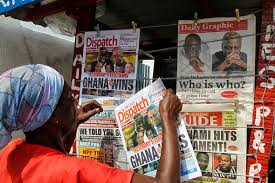The report that President Nana Addo Dankwa Akufo-Addo has reiterated his administration’s commitment to continue partnering with the private sector to improve sanitation in the country is one of the trending stories in the Ghanaian press on Friday.
The Ghanaian Times reports that President Nana Addo Dankwa Akufo-Addo has reiterated his administration’s commitment to continue partnering with the private sector to improve sanitation in the country
He intimated that disposal of solid waste and establishment of waste treatment facilities required huge investment, stressing that government alone cannot shoulder that responsibility.
He commended, especially the Jospong Group of Companies (JGC) for its “relentless” efforts to support government to make Ghana the cleanest country in Africa.
The second phase of the ACARP, which adds 800-tons line to the existing 600-ton facility, will provide metropolitan municipal and district assemblies (MMDAs) within Greater Accra Metropolitan Area (GAMA) a viable and cost-effective alternative to dumpsites.
It will also increase the plant’s capacity to bridge the existing gap of untreated solid waste within the GAMA.
The Executive Chairman of Jospong Group of Companies, Dr Joseph Siaw Agyepong, disclosed that the project was made possible with the support of their partners, Lubo Recycling Systems of The Netherlands.
He disclosed that the expanded ultra-modern facility would add 1400 more tonnage to its existing capacity
He disclosed that the expanded ultra-modern facility would add 1400 more tonnage to its existing capacity of 600 tonnes of solid waste treatment, adding that this will further bring the total plant capacity to 2000 tonnes.
“Additional eight equipment are being manufactured by Lubo Bollegraaf Group for the Integrated Recycling and Composting Plants (IRECOP) in Ho, Takoradi, Tamale, and Techiman among others,” he revealed.
The newspaper says that Ghana may have no option than to return to the International Monetary Fund (IMF) for financial support if its debt continues to rise.
The debt, which is presently a little above ¢335 billion, continues to surge and create problems for the economy.
According to a Bloomberg survey, the country may have to pay a higher premium if it returns to the international capital market next year to issue a Eurobond.
“The answer seems to be no.”
Ghana has historically relied on funding from the Eurobond market to fund expenditure. But limited access to international loans could force the government to supply more debt locally, which would be detrimental to cedi yields as banks and institutions already own about 80% of the financial instrument.
Ghana’s dollar bonds are the worst performers this month in a Bloomberg index tracking emerging-market hard-currency debt, with a decline of 5.8 percent . The 2025 yield jumped 153 basis points on Monday, 18th October, 2021, the most in a day on record since the debt began to trade in April 2021.
It climbed a ninth consecutive day on 20th October, 2021 by 4.0 basis points to 11.28 per cent, the highest on record.
Oil hit a three-year high above $86 a barrel yesterday driven by tight supply and a global energy crunch, although prices eased as some investors took profits on signs the rally is looking overstretched.
Helping to drive the latest gain, a supply report from the U.S. Energy Information Administration on Wednesday showed crude and fuel inventories tightened, with crude inventories at the Cushing storage hub falling to a three-year low.
Brent crude rose as high as $86.10, the highest since October 2018, but was down 92 cents by 1.1 per cent, to $84.90. United States (US) West Texas Intermediate crude fell 74 cents, or 0.9 per cent, to $82.68.
“Traders who had set $86 as their selling threshold took the opportunity to already pocket some profit. Oil prices took a dive as a result,” Louise Dickson of Rystad Energy said.
The price of Brent has risen over 60 per cent this year, supported by a slow ramp-up in supply by the Organisation of the Petroleum Exporting Countries and allies, and a global coal and gas crunch which has driven a switch to oil for power generation.
The Ghanaian Times also reports that President Nana Addo Dankwa Akufo-Addo has called for civility and tolerance in the ongoing public discourse on the anti-gay bill currently before Parliament.
Without taking any position on the matter, the President stressed the need for the public to respect each other’s opinion on the matter.
President Akufo-Addo said this in a radio interview on Peace fm, an Accra-based radio station, on the first day of his tour of the Greater Accra Region yesterday.
The Proper Human Rights and Ghanaian Family Values Bill, a private member’s bill sponsored by some law makers, seeks to, among others, criminalise the practice and promotion of same sex relations in Ghana.
Considered as the world’s toughest anti-gay laws, the bill, which proposes a ten-year jail term for gay activists, has received the support of religious organisations and individuals.
But a group of high profile lecturers, lawyers and civil society organisations have kicked against the bill, expressing concerns over the human rights abuses in the bill.
The Parliamentary Committee on Constitutional and Legal Affairs, which is currently considering the bill, has received over 130 memoranda in support and against the bill.
President Akufo-Addo expressed satisfaction that opportunity had been created for a private member-sponsored bill to be considered by Parliament and the legitimacy of the consideration process.
“What I hope for is that the debate itself would be civil and that we would recognise the need for us to be tolerant, of each other’s views even when they are opposing views,” he said.
GIK/APA


